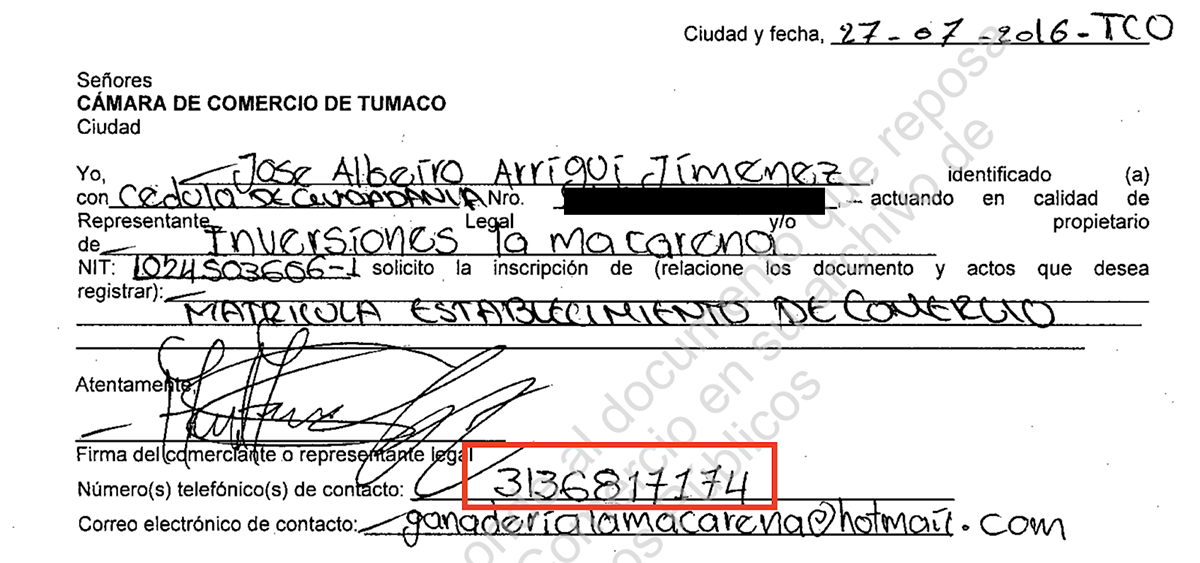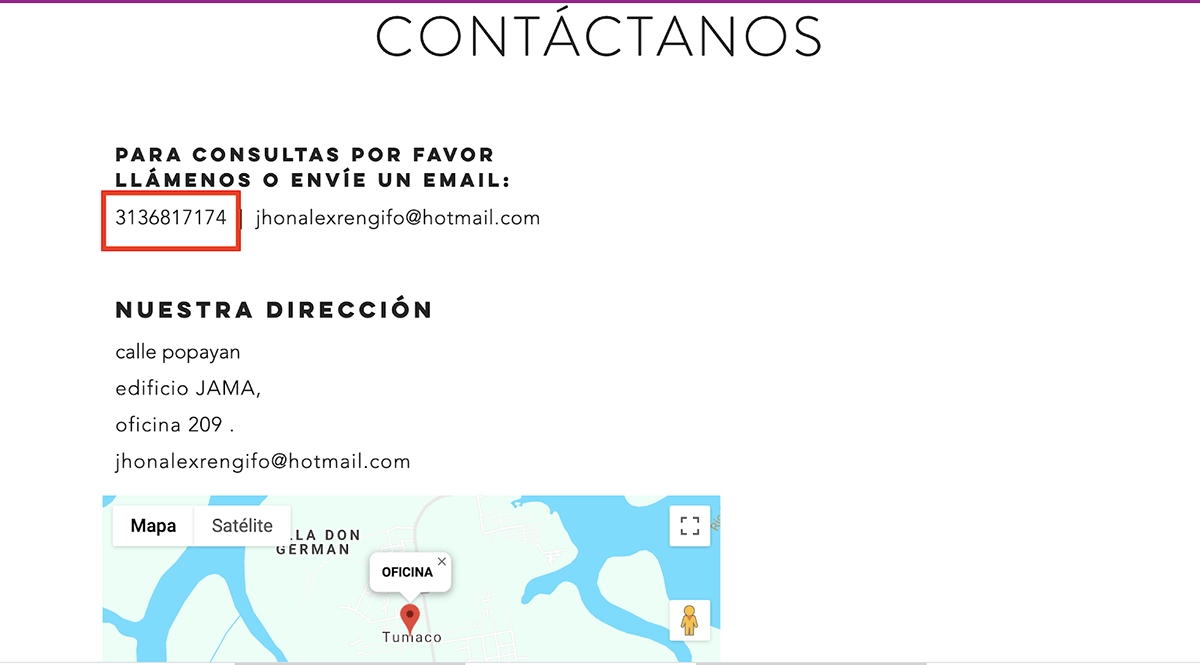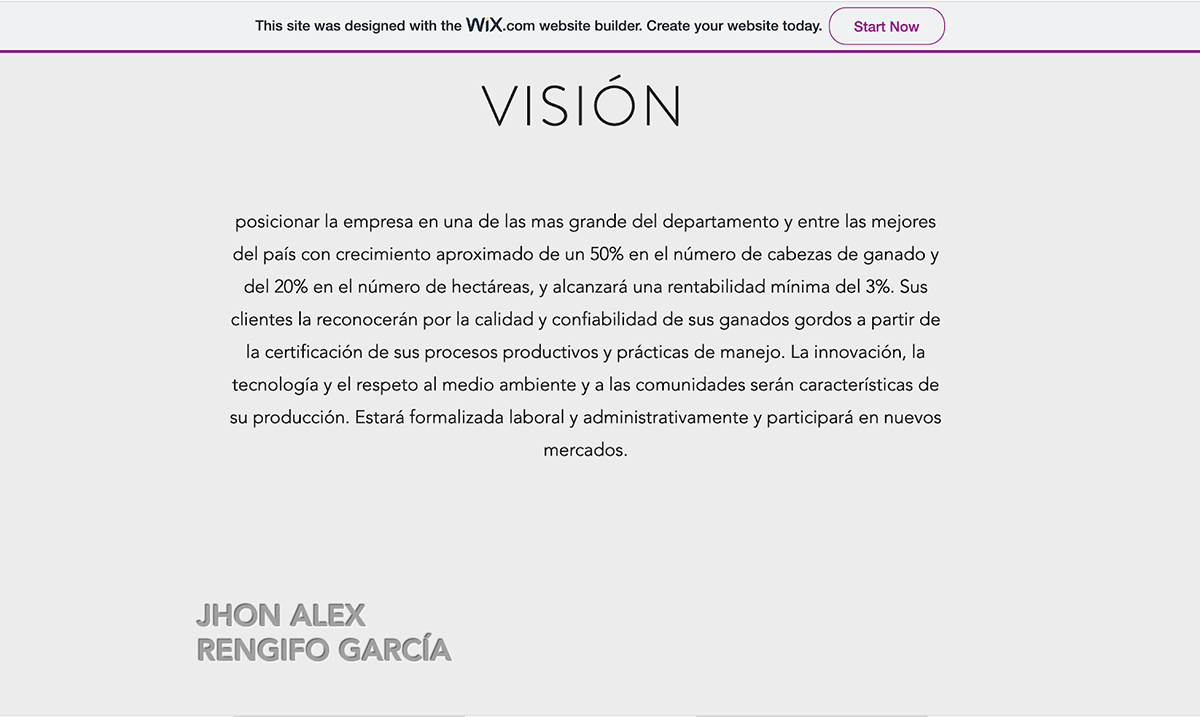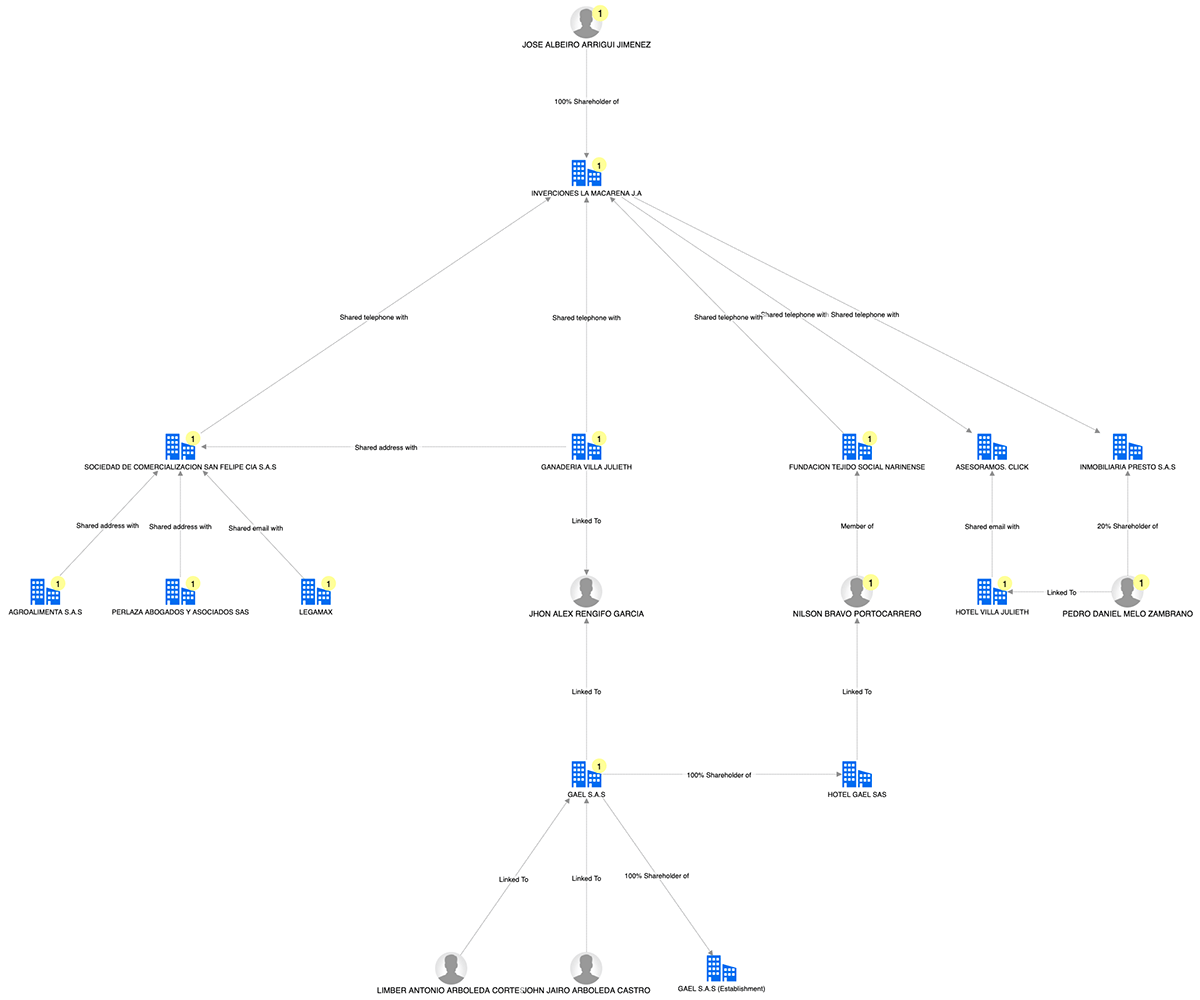This case demonstrates the value of using non-traditional identifiers such as phone numbers and email addresses gleaned from public records to better understand the nuances of complex, interwoven criminal networks.
Colombian Authorities Arrest the ‘Accountant’
On February 21, members of Colombia’s Attorney General’s Office (FGN) and the National Police arrested José Albeiro Arrigui Jiménez (aka Contador, the Spanish word for accountant) in the southern department of Caquetá. Arrigui is considered to be one of the most important drug traffickers operating in the southwestern part of the country. Colombian authorities allege that he is responsible for coordinating the production and shipment of tons of cocaine from the Pacific Coast to El Salvador, Honduras, Guatemala, and Mexico.
Colombian authorities have also accused Arrigui of coordinating targeted assassinations against demobilized members of the now-defunct Revolutionary Armed Forces of Colombia (FARC)—Colombia’s largest guerrilla group that signed a peace agreement with the government in 2016—as well as social leaders. He also allegedly has connections to the Sinaloa Cartel.
Arrigui was believed to mainly operate out of the southwestern Nariño department, specifically in the coastal municipality of Tumaco. Nariño is one of the most important regions for coca production in the world, and is also a key transport and departure point for cocaine heading north towards Central America and Mexico. The U.S. District Court for the Eastern District of Texas has requested his extradition, according to the FGN.
Tracing the ‘Accountant’s’ Network Using Public Records
While much has been covered regarding Arrigui’s ties to various criminal groups in southwestern Colombia—including groups and individuals that were previously affiliated with the FARC—very little is publicly known about his corporate network. Corporate records not only provide additional information on the geographic range of Arrigui’s operations, but also allow us to get a better sense of his links to other alleged or convicted drug traffickers as well as the types of businesses he might have used to launder money or transport cocaine.
Public records show that in July 2016, Arrigui founded a business establishment in Cali—the capital of the southwest Valle del Cauca department—called Inverciones La Macarena J.A. The principal business activity of the establishment is cattle breeding, an activity that has long been used by drug trafficking organizations across Latin America to launder the proceeds of illicit activities. Not only does cattle ranching provide a legitimate front to invest dirty cash, it also allows traffickers to make land grabs and control key swaths of territory used to transport drugs.
While Arrigui does not appear to be linked to any additional companies in Cali, at least two phone numbers listed for Inverciones La Macarena match the phone numbers of a company, an establishment, and a foundation in Tumaco, along with a now-defunct real estate business in Popayán, in the southwestern Cauca department. The four legal entities are:
- Sociedad de Comercializacion San Felipe S.A.S (Tumaco, Nariño)
- Asesoramos. Click (Tumaco, Nariño)
- Fundacion Tejido Social Nariñense (Tumaco, Nariño)
- Inmobiliaria Presto S.A.S (Popayán, Cauca)
Additionally, buried within the corporate registration filings for Inmobiliaria Presto is a notice from a Colombian prosecutor written to the Cauca Chamber of Commerce indicating that the Colombian government ordered the company’s assets to be frozen on Nov. 13, 2018. While it is unclear from the documents why exactly the company’s assets were frozen, this often happens to individuals or companies that are subject to criminal investigations regarding drug trafficking or money laundering. Inmobiliaria Presto officially closed on Jan. 30 2019.
Arrigui’s Connections to the ‘Pablo Escobar of Ecuador’
While Ganaderia Villa Julieth does not appear in the Tumaco Chamber of Commerce, it does share an address and phone number with Sociedad de Comercializacion San Felipe. The shared address and phone number paired with its apparent involvement in the cattle industry, suggest that Ganaderia Villa Julieth could potentially be a fictitious name for Sociedad de Comercializacion San Felipe. However, we were unable to confirm this using official public records.


Fig 1. Left: A phone number listed on the company registration form for Inverciones La Macarena J.A. Right: A phone number listed on the website for Ganaderia Villa Julieth.
Perhaps most notably, the website for Ganaderia Villa Julieth also includes the name Jhon Alex Rengifo García. This name matches the pseudonym used by Edison Washington Prado Alava (aka Gerald), an Ecuadorian national who has been dubbed the “Pablo Escobar of Ecuador.”

Fig 2. A page from the website of Ganaderia Villa Julieth showing the name Jhon Alex Rengifo García.
A fisherman-turned international drug trafficker, Prado Alava was one of the most prominent cocaine traffickers operating in Ecuador and southwest Colombia—including in Tumaco and Cali—at the time of his arrest in April 2017. He was extradited to the United States in February 2018 and was sentenced in December of the same year to 235 months in prison after pleading guilty to ”conspiracy to distribute five kilograms or more of cocaine, knowing that it would be unlawfully imported into the United States.”
Apart from Ganaderia Villa Julieth, Prado Alava, again using his pseudonym Jhon Alex Rengifo García, appears as an “industrial shareholder” (socio industrial) of a Tumaco-based company specializing in construction materials, called Gael S.A.S. Industrial shareholders do not own shares in a company, according to Colombia’s corporate legal framework. Instead, they provide general technical or commercial services to the legal entity.
Also listed as industrial shareholders of the company are two individuals named Limber Antonio Arboleda Cortes and John Jairo Arboleda Castro. Both individuals were indicted on drug trafficking charges in January 2018.

Fig 3. Part of Arrigui’s corporate network, including ties to Edison Washington Prado Alava (aka Jhon Alex Rengifo García).
Additionally, Gael S.A.S is the owner of two establishments, one of which is a hotel located in Tumaco, called Hotel Gael SAS. An individual by the name of Nilson Bravo Portocarrero is listed as the contact person for the hotel by the Department of Nariño’s Tourism Directorate. Bravo Portocarrero is also one of three principal members of Fundacion Tejido Social Nariñense, the Tumaco-based foundation whose phone number matches one of the phone numbers of Inverciones La Macarena.
Bravo Portocarrero also previously owned Asesoramos. Click, the Tumaco-based publicity and business consulting establishment that also shares a phone number with Inverciones La Macarena.
Colombian Authorities Target Prado Alava’s Money Laundering Network
In November 2018, Colombian law enforcement, with support from the U.S. Drug Enforcement Administration (DEA), arrested 24 individuals who allegedly served as frontmen to launder the proceeds from Prado Alava’s drug trafficking activities. The individuals allegedly owned various properties, luxury vehicles, and companies used to obfuscate Prado Alava’s illicit earnings. Authorities also found that several properties were used to stash “large quantities” of cash.
Interestingly, the operation was carried out at around the same time that Colombian prosecutors froze the assets of Inmobiliaria Presto, the Popayán-based real estate company that shared a phone number with Inverciones La Macarena. Furthermore, on the same day that Colombian authorities froze the assets of Inmobilaria Presto, they also carried out the same action against Legamax, another Tumaco-based cattle-breeding business that shares an email address with Sociedad de Comercializacion San Felipe.
This suggests that both Inmobiliaria Presto and Legamax could potentially have been used to launder Prado Alava’s illicit proceeds.
Corporate Records Suggest Potential Overlap of Criminal Networks
More broadly, overlapping criminal networks are common across Latin America, where it is often difficult to distinguish where one organization ends and another begins. This is especially true for complex money laundering networks; money launderers and other shady financial operatives often work independent of any one particular organization.
As this case demonstrates, public records—along with non-traditional identifiers such as phone numbers and email addresses—can serve as a helpful tool to better understand where and how criminal networks overlap, thus allowing investigators to get a more holistic view of an organization’s operations.